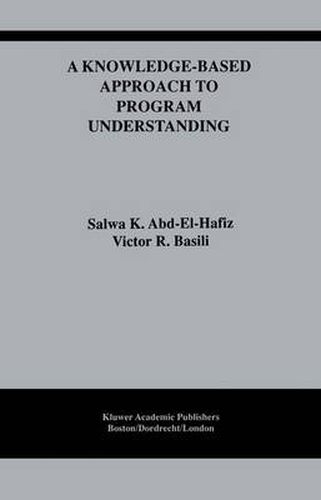Readings Newsletter
Become a Readings Member to make your shopping experience even easier.
Sign in or sign up for free!
You’re not far away from qualifying for FREE standard shipping within Australia
You’ve qualified for FREE standard shipping within Australia
The cart is loading…






This title is printed to order. This book may have been self-published. If so, we cannot guarantee the quality of the content. In the main most books will have gone through the editing process however some may not. We therefore suggest that you be aware of this before ordering this book. If in doubt check either the author or publisher’s details as we are unable to accept any returns unless they are faulty. Please contact us if you have any questions.
Program understanding plays an important role in nearly all software related tasks. It is vital to the development, maintenance and reuse activities. Program understanding is indispensable for improving the quality of software development. Several development activities such as code reviews, debugging and some testing approaches require programmers to read and understand programs. Maintenance activities cannot be performed without a deep and correct understanding of the component to be maintained. Program understanding is vital to the reuse of code components because they cannot be utilized without a clear understanding of what they do. If a candidate reusable component needs to be modified, an understanding how it is designed is also required. of This monograph presents a* knowledge-based approach to the automation of program understanding. This approach generates rigorous program documentation mechanically by combining and building on strengths of a practical program decomposition method, the axiomatic correctness notation, and the knowledge based analysis approaches. More specifically, this approach documents programs by generating first order predicate logic annotations of their loops. In this approach, loops are classified according to their complexity levels. Based on this taxonomy, variations on the basic analysis approach that best fit each of the different classes are described. In general, mechanical annotation of loops is performed by first decomposing them using data flow analysis. This decomposition encapsulates interdependent statements in events, which can be analyzed individually.
$9.00 standard shipping within Australia
FREE standard shipping within Australia for orders over $100.00
Express & International shipping calculated at checkout
This title is printed to order. This book may have been self-published. If so, we cannot guarantee the quality of the content. In the main most books will have gone through the editing process however some may not. We therefore suggest that you be aware of this before ordering this book. If in doubt check either the author or publisher’s details as we are unable to accept any returns unless they are faulty. Please contact us if you have any questions.
Program understanding plays an important role in nearly all software related tasks. It is vital to the development, maintenance and reuse activities. Program understanding is indispensable for improving the quality of software development. Several development activities such as code reviews, debugging and some testing approaches require programmers to read and understand programs. Maintenance activities cannot be performed without a deep and correct understanding of the component to be maintained. Program understanding is vital to the reuse of code components because they cannot be utilized without a clear understanding of what they do. If a candidate reusable component needs to be modified, an understanding how it is designed is also required. of This monograph presents a* knowledge-based approach to the automation of program understanding. This approach generates rigorous program documentation mechanically by combining and building on strengths of a practical program decomposition method, the axiomatic correctness notation, and the knowledge based analysis approaches. More specifically, this approach documents programs by generating first order predicate logic annotations of their loops. In this approach, loops are classified according to their complexity levels. Based on this taxonomy, variations on the basic analysis approach that best fit each of the different classes are described. In general, mechanical annotation of loops is performed by first decomposing them using data flow analysis. This decomposition encapsulates interdependent statements in events, which can be analyzed individually.